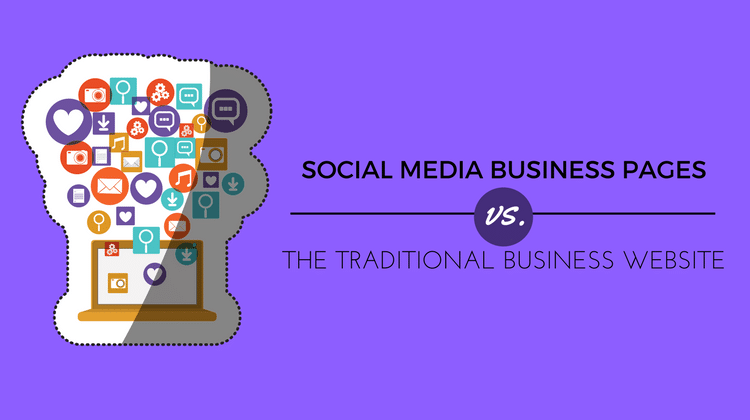
I had someone recently ask me, “Do I need a website of my own since I already have an active social media presence?”
The short answer: No. A website isn’t a requirement, no different than any other marketing medium. You’re the boss, and you’ve earned the right to decide what marketing strategies you’ll pursue and what marketing strategies you won’t. It all boils down to your business model and how you want to present yourself to the world.
With social media platforms like Facebook, Twitter, Instagram, and LinkedIn all providing billions of subscribers already engaging on their platforms, creating a traditional website might not be part of your plan.
Guess what? You’re not alone. Clutch, a research firm based in Washington D.C., recently surveyed small businesses and found that 29% of respondents don’t have a website. More interestingly, 31% of those companies lacking traditional websites are using social media business pages in place of the traditional site.
Is that a good plan? It depends.
Having been marketing for professional services, specifically lawyers, I would never recommend skipping the website and focusing all our energy on social media. In the legal world, credibility is everything. Functioning within an extremely competitive landscape, a firm without a website is a firm that doesn’t exist.
There are two main reasons why I would never recommend excluding a business website from the digital marketing plan:
1. Premature Disqualification
Think about your behavior. When you are in need of any product or service, where is the first place you look? Google, of course!
For me, if a company doesn’t have a website, I move on to one that does. And trust me, your competitors do.
I’ll give you an example:
I was intrigued by a post I saw on my local mom’s Facebook group, where someone was looking for recommendations for an overnight babysitter since she worked a night shift. A fellow member responded to the post by suggesting she get an Au Pair. (For those that don’t know, an Au Pair is a live-in child caregiver from another country on a cultural exchange). The woman posting claimed, “It costs much less than traditional child care,” and she posted the agency’s Facebook business page for further information.
My ears perked up. I was not looking for childcare, yet this conversation between two other moms hit a pain point for me: child care costs. Being a good consumer, I navigated my way over to the agency’s Facebook page.
There were pictures of kids running around with their nannies, having a perfect time! I read a few blog posts about what to expect when your Au Pair arrives in the US, how to make her feel comfortable, and ways to show her the American culture. But no pricing or signup information appeared — at least not as far as I scrolled. I did find a phone number listed, but I wasn’t ready to talk to anyone yet.
So, what do you think happens? I don’t find the information on Facebook, I don’t feel like calling them, so I say, “Oh well. Not for me”.
Of course not!
No, I googled the agency to find their website, which I was certain would have the relevant information. I didn’t find their website though. As far as I could tell, they didn’t have one. I did, however, find several other agencies that had websites that provided my answers.
It is common for consumers to gather research on your business before ever contacting your business. Very often, a potential client will disqualify your company before you ever knew they were considering it.
2. You Don’t Own Your Social Media Page. Are You Down with OPP?
O.P.P., how can I explain it? I’ll take it frame by frame it. (Naughty by Nature, fan? You’re welcome).
Seriously though, social media networks fall under “OPP,” meaning they are other people’s’ platforms. You don’t own them. Of course, setting up a business page is fast, easy, and free! Plus there are already loads of potential customers using the platforms that you could leverage.
Who wouldn’t be down with that?
However, since the platform is owned by someone else, you are at their mercy. You have no say when the owners make changes to the platforms; why they are making the changes; or how the changes affect your business.
Consider when Facebook and Instagram made changes to their algorithm to filter the content so that the newsfeed only displayed content that was found to be relevant to the user.
What happened?
Marketers went nuts when organic reach dropped significantly. That’s what happened!
When these things occur, it is not the end of the world. Where there’s an algorithm challenge, there is also a way around it. So, No big deal, right?
Right! It’s not a big deal, necessarily, to have to overcome a few algorithm changes here and there. But, (there’s always a but), when you don’t own the platform, you also don’t own the data.
What if Facebook went bankrupt? Suppose Instagram was suddenly insta-gone. How would you engage with your audience?
I know, I know. There is no way this multi-billion dollar industry is going to fold. You’re probably right. But I’m not asking you to consider the probability. I’m asking you to consider the possibility.
Case in point: MySpace went bye space. I miss having a cool theme song to accompany my profile. You?
Don’t get me wrong; social media is an important piece of your marketing strategy. I would just suggest using it to drive the audience to the content housed on the site that you built and you own.
What do you think?


